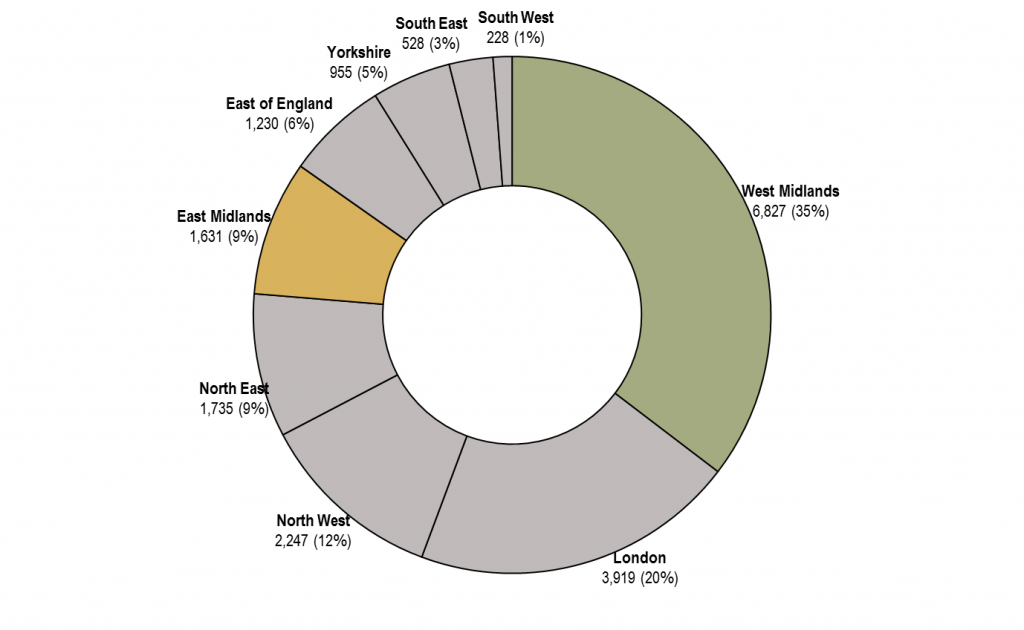Dr David Jarvis (Reader in Local and Economic and Regional Development in the Applied Research Centre in Sustainable Regeneration – SURGE) presented a talk at the West Midlands Economic Forum (WMEF) held at Coventry University on 20th June.
WMEF is a discussion forum that aims to bring together experts on the regional economy to improve understanding of the West Midlands regional economy in a global context. This latest event was designed to stimulate discussions about the global competitiveness of the wider Midlands economy, exploring the economic logic of a ‘Midlands’ proposition, within the context of Local Enterprise Partnerships (LEPs) as strategic delivery bodies for fostering and sustaining regional growth,.
David’s talk, included in a session on the Midlands LEPs growth strategies alongside Colin Crane (Wolverhampton City Council and Paul Forrest (West Midlands Economic Forum) highlighted the importance of both the East and West Midlands for the UK economy. The main focus of the talk, which draws on research currently being conducted in SURGE about the activities of LEPs, was to highlight that similar themes (based around business, people and place) were used across the LEP Strategic Economic Growth Plans. The existence of such similarities might indicate a logic for a more joined-up approach in the Midlands to foster growth across the region. The talk began by highlighting the economic importance of the Midlands in England, as seen in the table below.
| The Midlands as % of England | |
| Population (2013) | 19.09 |
| GVA (2012) | 15.77 |
| Export trade (2012) | 17.83 |
| Expenditure on R&D within businesses (2012) | 14.81 |
| Employment Aged 16+ (Feb. 2014) | 18.29 |
| Qualifications: NVQ 4 and above (2013) | 15.52 |
Source: Office for National Statistics
Furthermore, the region experienced the largest percentage increase in exports between 2010 and 2013 of 19.3% which was the largest increase experienced by any English region. It was highlighted that the Midlands as a whole represents a substantial proportion of Foreign Direct Investment (FDI) within England, but that there was significant variation between the East and West Midlands. The West Midlands dominates in terms of the number of FDI projects and in terms of the number of jobs this investment has created, as seen below.
Source: E&Y UK Attractiveness Survey 2014
The talk then moved on to discuss the findings of a recent analysis of the Strategic Economic Plans produced by each of the LEPs carried out in SURGE. The analysis reiterates the findings of a recent IPPR report which highlights how these plans varied greatly in size and level of detail. The analysis then explored the key themes of the LEPs plans for growth to reveal that in most cases all LEPs aim to address growth via broadly similar pathways. These include: investment in R&D, stimulating business, entrepreneurship, skills and workforce development, employability, social inclusion, rural development, town centre development, housing, transport, place promotion and infrastructure. The one exception being that Greater Birmingham and Solihull did not include plans for rural development, but given the nature of the area, this is not really surprising.
What this analysis suggests is that with similar goals and strategies for growth there may be potential for cross-Midlands LEP collaboration, particularly as there are some areas that belong to more than one LEP. One example presented was HS2 which is mentioned in all but two of the LEP Strategic Economic Plans. The plans all recognise that the development of the railway network as part of the developments for HS2 represent a potential opportunity to transform connections between regions and act as a catalyst for physical regeneration. The question was raised as to whether there is any advantage to the strategic co-ordination of some economic functions / policy interventions for the East and West Midlands?
The session, moderated by Peter Plisner (Business and Transport Correspondent, BBC Midlands) raised a number of questions from the audience on how LEPs might go about fostering collaboration in the region, and highlighted the importance of communication between LEPs to foster growth more widely across the region.
To view the press release for the event please visit: http://westmidlandseconomicforum.co.uk/images/uploads/WMEF_Press_Release-The_Midlands_Economy_East__West_Dimensions-Friday_20th_June_2014-Coventry_University.pdf
To find out more about the West Midlands Economic Forum please visit: http://westmidlandseconomicforum.co.uk





Comments are disabled